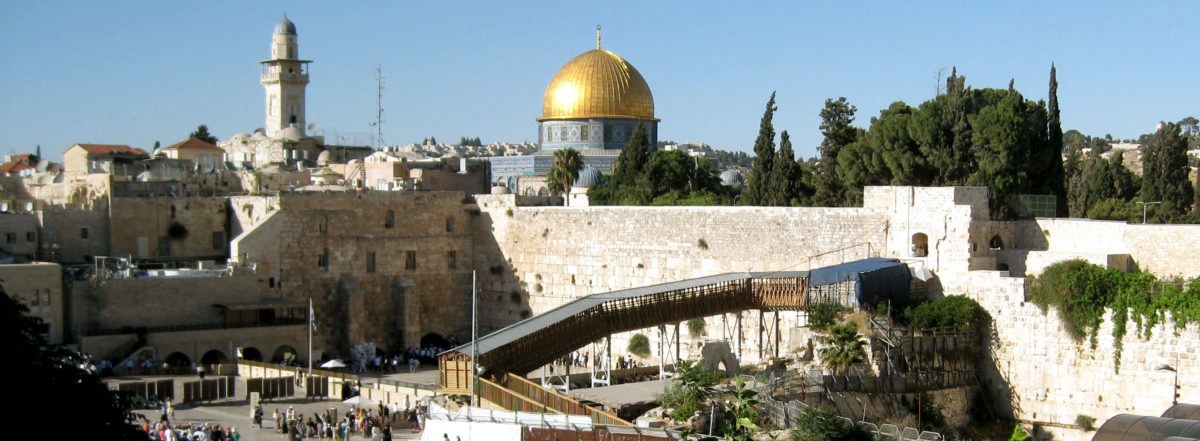Kinue Tokudome*
(A slightly shorter version of this article in Japanese was published by WebRonza)
Ziv Medical Center
Sefed is a city in Northern Israel with a population of 35,000, having close borders with Lebanon to the North and Syria to the East. Its history goes back all the way to the Biblical times. Crusaders built a massive fortress in the Middle Ages, and during the 16th Century it became a center of Kabbalah, the mystical school of thought of Judaism. Since the 1920s, Jewish residents and Arab residents were in constant clashes, and in the fierce battle in the War of Independence in 1948, Jews took control over the city. Young Mahmoud Abbas fled with his family from Safed to Syria at that time. Despite many wars that have been fought upon it, this beautiful city overlooking the Sea of Galilee in the South has been a popular place for many artists.
Ziv Medical Center located in Safed treated almost 1,500 wounded or sick Syrians in the past five and a half years. They came to the Israeli border with the desperate hope of getting medical treatment that was no longer available in their civil war-torn country. It became known as Israeli Defense Forces’ “Operation Good Neighbor.” With Syria’s Assad regime regaining its control over the border area, the operation ended this summer.
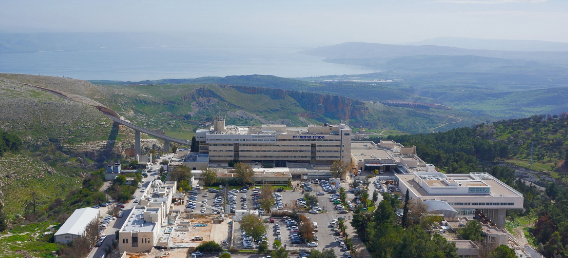
Ziv Medical Center in Safed overlooking the Sea of Galilee in the South
(photo: from the website of Ziv Medical Center)
Recently, Rabbi Abraham Cooper, Associate Dean of the Simon Wiesenthal Center, Mrs. Cooper, and I had the opportunity to visit this hospital and listen to the two doctors who explained to us what took place.
Meeting with us were the Director of Ziv, Dr. Salman Zarka, and the Director of the Neonatal Intensive Care Unit, Dr. Eric Shinwell. Dr. Zarka grew up in a Druze family not far from Sefed and served in the Israel Defense Forces (IDF) for 25 years. Until assuming the position of Ziv’s Director four years ago, Colonel Zarka was the head of the Medical Corps of the Northern Command of IDF. Dr. Shinwell received his medical education at Queen’s College in England.
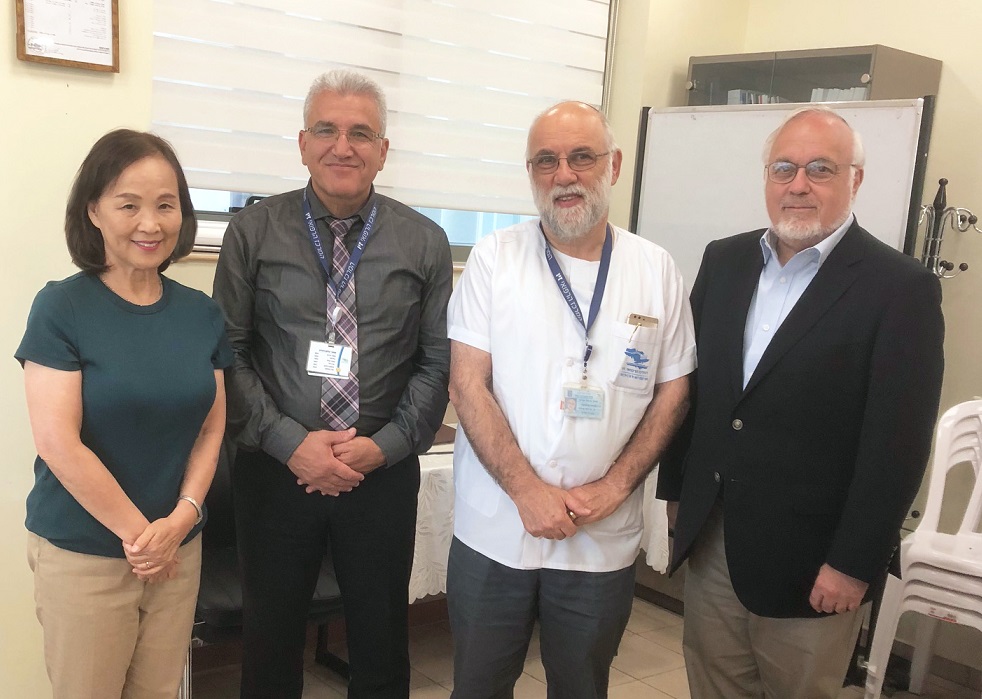 Author, Dr. Salman Zarka, Dr. Eric Shinwell and Rabbi Abraham Cooper
Author, Dr. Salman Zarka, Dr. Eric Shinwell and Rabbi Abraham Cooper
First, Dr. Zarka presented the overview of the Ziv Medical Center.
“Ziv was established in 1910 by Baron Edmond James de Rothschild in order to provide medical support for the Jewish population living in this area at that time. We are now a governmental hospital, small to moderate, with 350 beds and 1,700 staff. We are providing medical support to the people in Northern Israel, a wonderful mosaic of different traditions and religions of about 300,000 people. They are Jews, Arab Muslims, Druze, Arab Christians, and others. Mostly these people are in low socioeconomic status. They lean on governmental health system. This area is in northern periphery of Israel and people do not have the same facilities that we have in Jerusalem or Tel Aviv. My main challenge is to provide medical support for these people with different cultures.”
Dr. Shinwell added.
“It is not just patients who are a mix of different religions and backgrounds but also the staff. Everybody is together on the both sides all the time. And it does influence all sorts of things.”
Dr. Zarka also explained the unique issue faced by the hospital.
“Because we are very close to both borders with Lebanon and Syria we need to be ready for wartime. During the second Lebanon War in 2006, we treated more than 1,500 wounded residents and soldiers. Ziv was hit directly by missiles from Hezbollah, but continued saving lives under fire for 33 days. We worry about the third Lebanon War. We hope it won’t happen, but we need to be ready for a war scenario.”
Syrians Suddenly Appeared on the Border
Dr. Zarka explained how it started.
“It started on Saturday, February 16, 2013, when seven Syrian wounded, moderate to severe, got close to our border at the Golan heights. It happened abruptly. The military battalion’s medical staff came to the point and treated them. But they decided that in order to save their lives, all of them had to be evacuated to Ziv. So, these seven Syrians came to our hospital with the military ambulances. Hospital staff treated all of them, operating on some. They were hospitalized for ten days, and then they all went back to Syria.
It was top secret. No media. And the patients were treated and hospitalized in isolated rooms with the military personnel/police that guarded them. These people were coming from Syria, our sworn enemy. It really could have been a catastrophic effort. But fortunately, everything went well and the Syrians were treated and they went back.
But after that, we needed to evaluate the situation because we could not have two sudden occasions. Only one was enough. We discussed the situation with the Army. I just finished my position as the Commander of the Medical Command of the North. We began discussing with the different partners about what we would do with a second event.
The Syrian civil war had started in 2011, two years before these Syrians came to our border. At that time, we decided to just take security issues at the border, and not to take part in this internal conflict. But after this event, we understood that this conflict was coming close to our border and that this event would not be isolated. We needed to decide what to do in the next event. Shall we close the border? It’s legitimate according to international laws to close the border. And to put out signs to the Syrians not to come close to our border. On the other hand, we had resources to take care of wounded Syrians. Why not just to extend a hand and offer medical support?”
Decision Made to Treat Syrians
“We had to consider other issues. Thinking of Syrians, the first thing we can think of was the Yom Kippur War with many causalities from both sides. The Golan Heights are filled with monuments of that bloody war. And all my job, as the Commander of the Medical Corps of the Northern Command, was to be ready for a wartime that would happen from Syria. So, thinking about your sworn enemy, it’s really legitimate to decide to close the border. And wait for something better to happen to the other side. But as I said, we decided not to do so. And I am very happy that the decision of the IDF and later of the government was to provide medical support to the Syrian people.”
Dr. Shinwell added.
“Not everybody agreed. After it became public that we were treating Syrians, there were protests, letters in newspapers, and editorials against opening the border.”
Dr. Zarka continued.
“We learned from the first wave that severely wounded would not survive the wait from the border to the hospital. It could take two hours, especially in the winter. And if they were bleeding, they would not survive that time. So, the decision was to construct a medical field hospital on the border to provide medical support to the Syrians there. This was started in March of 2013, one month after the first event. Syrian patients could get to the military field hospital and some went home after receiving treatment there. If patients needed further treatment, they were brought to this hospital or some other hospital in the region. So, this is how it’s started and we would eventually treat 1,500 Syrians in the next five and a half years.”
Providing the Same Care as Israelis
“We encountered more issues after they were brought to this hospital. First, we did not know about treatments they had received at the other side of the border as they were coming with no documentation. We were not sure about their allergy or medication they had taken. One time, we found out what had gone wrong with the previous treatment only after we performed an abdominal surgery.
Then there was the issue of what level of treatment we should provide to Syrian patients. You already mentioned about our experience of sending IDF Medical Corps’ humanitarian aid to all over the world. It is mostly done for two weeks in a disaster area by the WHO humanitarian standard. Humanitarian standard aims to save lives, not to improve quality of life. You have limited resources and limited time. To use an example, in order to save life, a seriously wounded leg would be amputated. To amputate is one operation. Two days of hospitalization and then the patient would be released. Unfortunately, without the leg, but he is alive.
But it’s not the standard of care of Israel. If a person comes to Ziv from a road accident, my staff will try their best to save the leg. Saving the leg means about 8-10 operations, 3-4 months of hospitalization and rehabilitation, after 5-6 months the patient will be released on foot. So, when a girl with a semi-amputated hand came to the field hospital, we discussed what we should do. We could only amputate the hand and let her go back to Syria. But we decided that there could be an ethical issue when you have resources and you decide not to use it. We had a discussion with the Army. Army decided to pay our hospital as if we were treating soldiers. So, we were able to treat Syrians according to the Israeli standard.”
Dr. Shinwell raised another issue.
“We faced the next problem. When we had the resources, it did raise a question about whether the resources that were being assigned to the Syrians in anyway limited the resources available to Israeli citizens. There were times when there were conflicts. The intensive care unit was full with Syrians. The question is what do you do when an Israeli comes in. I personally experienced one situation where doctors were standing around arguing. Who should be in the intensive care?
Jewish law says the poorest among us should come first. If you are a physician you should deal with your people first. And enemies or other people come later. But the ethics division of IDF had a big discussion on this and made a declaration that it was not valid in this case. We should treat the one who needs care the most first. It was very difficult to force yourself to do so. It’s easy to state the principle but when you have to actually do it in practice it’s very difficult.”
Dr. Zarka talked about the issue of expense.
“The government paid medical fees for a Syrian patient as an Israeli patient. But they were not Israelis and they would cost us more. Some of the Syrian patients were children who stayed with their mothers. We brought mothers food, clothes and so on. And releasing a girl with diabetes back to Syria was not the same as Israeli children. They might be treated for one week, then they would go home escorted by families. They could see a local doctor for follow-up. We treated this girl for three and a half months, and we had to think about insulin. Wonderful philanthropy people donated in order for her to continue the treatment. She had 1,000 syringes of insulin when she went back to Syria.”
Dr. Shinwell shared some other episode that he had to deal with.
“It was a real problem to provide a documentation. For example, babies who were born at our department were discharged with a discharge summary with not hospital paper. It was on a blank sheet of paper written in English with no name of the hospital as if it was a hospital somewhere, with the minimum necessary details. If we were to discharge them with Hebrew or even Arabic paper, identifying our hospital, we could be killing them.”
Effect on Syrians and Hospital Staff
At this point, I asked them if Syrians’ attitude changed over time as they received medical care.
Dr. Zarka remembered what it was like when he first saw Syrians at the field hospital.
“They had fear in their eyes. They seemed to be wondering what we would do. Will we inject something? Trying to kill them? But we decided to treat them according to the Israel standard and according to the Israel law. So, every patient who came to the field hospital or Ziv had to sign an agreement to be treated. If it was a child with no mother, we went to the Israeli court to ask for a permission to treat the child. Arabic speaking social workers made them feel comfortable. And things were getting changed. Syrians were coming to Israel without fear. They felt better to come. Some of them were coming back to continue their treatment. I heard them say how happy they were to come to Israel and be treated.”
But what Dr. Shinwell told us was insightful.
“Many Syrians expressed their gratitude. But there were people who found it very difficult to move from many years of education they had received. One of the resident doctors said to me that he once had a patient who told him, ‘I know I have to be here to receive treatment. But if I was not injured I would kill you.’ So, you can see the conflict. On the one hand, having to take care from a devil, but really wanting to kill that devil. Hopefully things will change, but it is not easy with generations of way of that thinking.”
Rabbi Cooper then asked about the impact on hospital staff.
Dr. Shinwell’s answer was very honest and moving.
“I think it is mixed. It is naïvely idealistic to pretend that everybody thought this was wonderful and would say, ‘Look at what good things we do.’ Our staff came from many different backgrounds. Take my department. There are Jews, religious and non-religious, Moslem Arabs, Christian Arabs, Druse Arabs, and another Arab group, all mixed. And attitudes of these groups towards Syrians were often quite different. And the Syrian conflict was also incredibly complicated with all sorts of different groups, which were based on religious and ethnic differences.
But I think most staff felt that we were professionals, we were doctors, nurses, pharmacists, social workers, or whatever. We are here to do our job. And I also think all of us knew that there was a bigger message in what we were doing.”
After one hour of informative conversation, Dr. Shinwell gave us a tour of the hospital. The pediatrics ward filled with sunlight was heartwarming. But we were reminded of the special burden this hospital must carry by Dr. Shinwell’s explanation when we went into a large lecture hall. “In time of a war, all the seats would be folded underneath so that this place could accommodate a large number of casualties.”
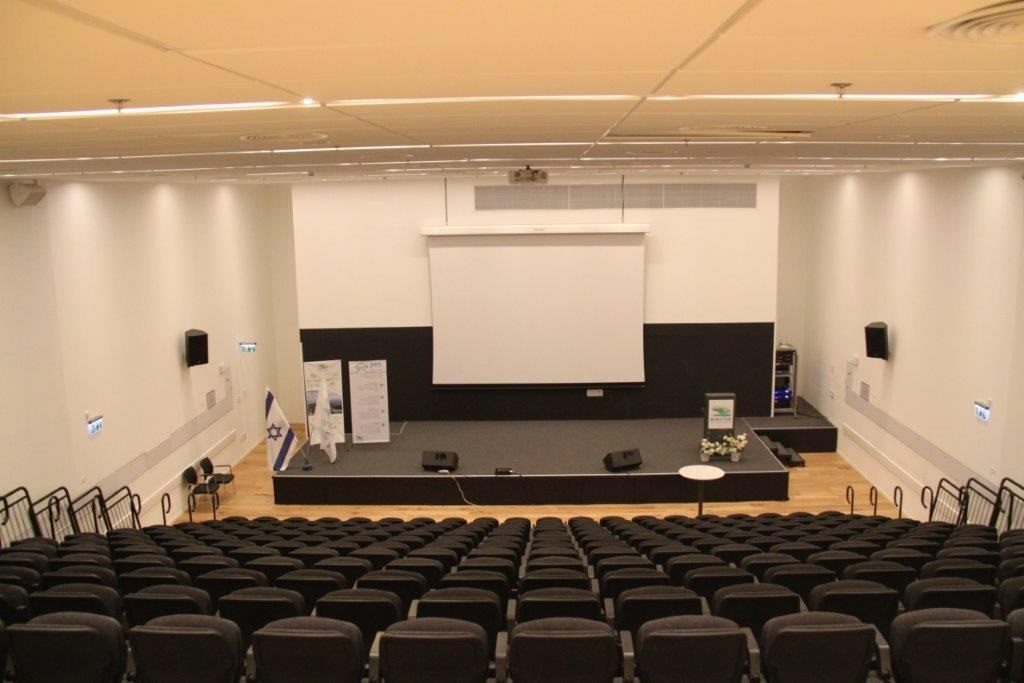 Ziv Medical Center lecture hall (photo courtesy of Dr. Eric Shinwell)
Ziv Medical Center lecture hall (photo courtesy of Dr. Eric Shinwell)
We left Ziv Medical Center with the hope that those Syrians who were born or received medical care here would one day be able to reveal it and express their gratitude publicly.
Next day, we were back in Jerusalem and had lunch with Mr. Michael Oren, former Israeli Ambassador to the US, a current member of the Knesset, and Deputy Minister in the Prime Minister’s Office. He had deep understanding of Japan, even being familiar with the phenomenon of anti-Semitic books in Japan in the 1990s when he was an advisor to the late Prime Minister Yitzhak Rabin. When he suggested that one good way for Japanese people to understand Israel would be to visit a hospital in Israel, both Rabbi Cooper and I immediately agreed.
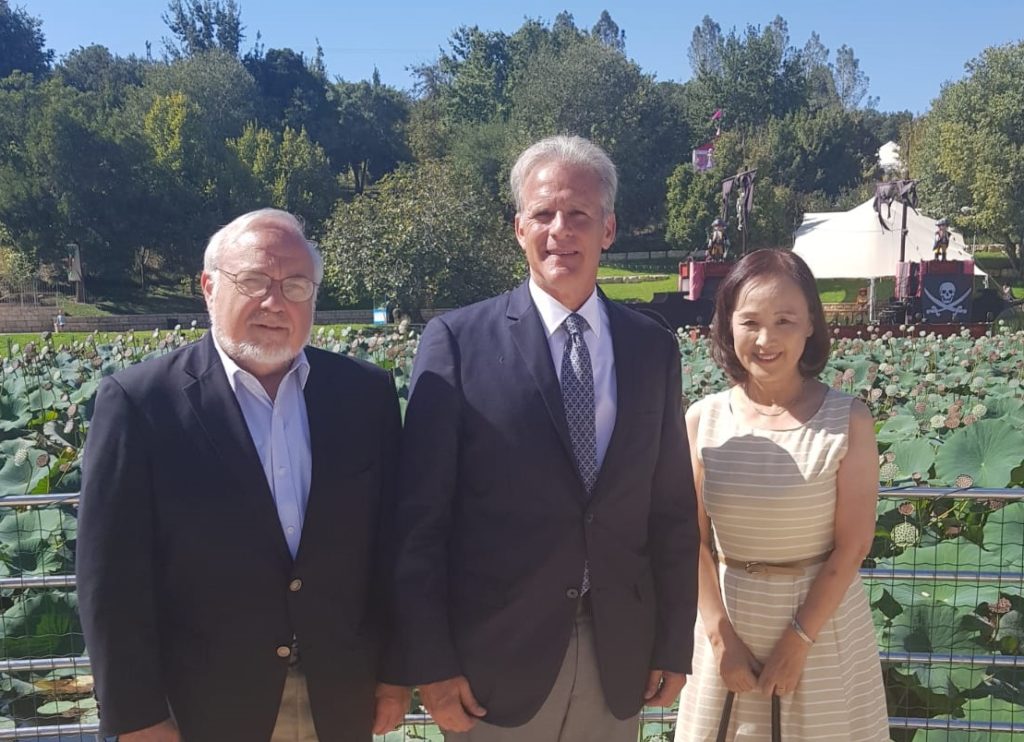
Rabbi Abraham Cooper, MK Michael Oren and Kinue Tokudome
Impact of Operation Good Neighbor
Some people view Operation Good Neighbor as a strategic operation to promote the good image of Israel. But it started when Israel provided medical care in response to the sudden appearance of wounded Syrian people at the border. It was in line with Israel’s long tradition of dispatching medical teams around the world wherever a major disaster struck, including Japan when it was hit by a major earthquake and tsunami. It should also be noted that these doctors did not know how many Syrian patients they would need to take care of and for how long. Yet they continued doing so as long as they were able. (Operation Good Neighbor as a whole provided medical care to 4,900 Syrians.)
I sent an email to Dr. Shinwell asking for his thoughts on this issue, to which he replied as follows:
“Although I do not feel qualified to comment on any potential political significance, in my other role as Dean of Medical Education in the Azrieli Faculty of Medicine of Bar-Ilan University, this has served as an excellent teaching opportunity for students learning medical ethics.”
Video on Ziv Medical Center’s work of helping Syrians.
*Kinue Tokudome is the author of Courage to Remember: Interviews on the Holocaust. She has written articles on Jewish people and the State of Israel for Japanese publications. She is currently working on a book about profound episodes in Israel that are not well known in Japan.
Blog: Jews and Japan http://jewsandjapan.com/
Twitter: Jews and Japan https://twitter.com/JewsandJapan
